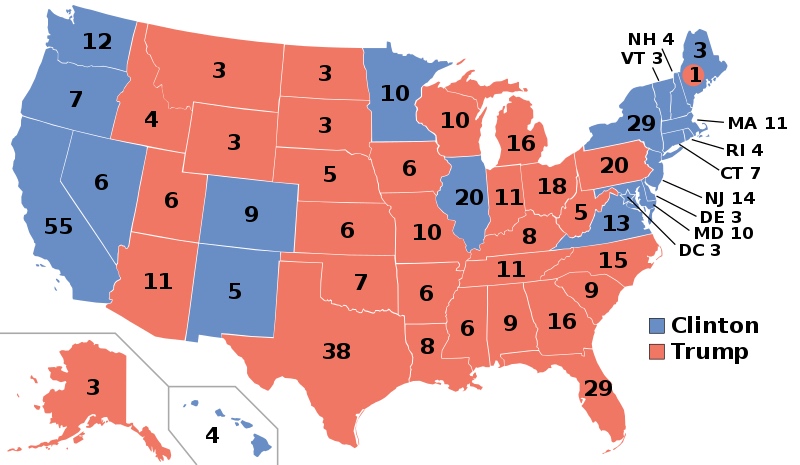Opinion: Electoral College conundrum: Why do we doubt such a great system?
After the 2016 election cycle concluded, many voters who were politically left-leaning and/or voted for Hillary Clinton protested the results. Republican candidate Donald Trump was victorious — despite the popular vote being in Clinton’s favor. Many online petitions started to garner public support to dismantle the Electoral College and have future elections be determined by popular vote rather than a delegate count from each state. Some political figures — and a sizeable amount of the population — find some kind of resolve in the popular vote. The Electoral College remains the better form of representative democracy for our election cycles, however dismantling the Electoral College could be unfair to the underrepresented, those in low population areas of the country, and could potentially create a tyranny of the majority.
The main argument for electing officials via the popular vote is that it would be a more direct representation of democracy. However, this does not factor in many variables about our country’s population, geographical spread of states, and the representation of certain policies or beliefs. If the population of the United States is mostly contained in the cities of Los Angeles, New York, Chicago, Houston and Philadelphia, then these cities — and the majority of their population’s candidate — would receive a disproportionate advantage to the opposing candidate. Smaller counties or states with smaller populations would have little representation for their majority candidate or their interests, effectively making their “democratic” impact miniscule compared to the impact of voters in larger cities or counties. Secondly, the popular vote could be easier to manipulate or corrupt. It is possible for an organization or group to mail in multiple ballots or forge ballots in support of a particular candidate or party. It is also possible for illegal immigrants, foreigners, or those who are not legally eligible to influence the number of electors in each state. States with more lenient voter ID laws or voter registration requirements could potentially allow illegal immigrants or foreigners to vote. Even then noncitizens can receive driver’s licenses or a social security number, which they could use to register to vote, according to the Washington Times. However, there are few individual cases where non-citizens have voted, and there is no official number of illegal immigrants who voted in previous elections or could illegally vote.
The most important reason for maintaining Electoral College is based in the very way our representative democracy works: We trust representatives of our cities, counties or states to speak and draft laws on our behalf and protect the interests of the people. Not only that, but the Electoral College is the best of both state representation and population representation, closely mimicking the way our national congress works. Congress is split into two houses — the House of Representatives and the Senate — to represent both the proportional population of each state and the respective states as a whole. The same reason congress is split into two parts is the same reason the Electoral College works: Electors are voted for in each state, the number of electors being proportional to the number of representatives and senators that state has in congress. Their votes for president are sent to congress and counted, and the majority vote determines the next president elect. Few electors vote contrary to the popular vote, mostly in cases involving pledged electors, electors who pledged allegiance to a particular party. One example where pledged electors influenced a presidential election was the 2000 election between George Bush and Al Gore, where the popular vote for Gore was overridden by the electoral votes for Bush. Despite this, the many electors use the popular vote to determine who to vote for, thus giving the popular vote power over who becomes the next president. Blaming the Electoral College completely misses the objective of protesters — placing false blame on what allowed Trump to win. It is important to reflect on the fact that the Electoral College was not created to take into account political parties, rather that electors vote for two candidates, the majority winner becoming the president and the runner-up becomes vice president. The 12th Amendment of the constitution changed this to accommodate parties, by making electors vote for a joint president and vice president rather than two distinct presidential candidates. Furthermore, dismantling the Electoral College would create a “tyranny of the majority” — the tyranny being that a particular section of the country could override any other interests or political factions through popular vote. This guarantees that certain political parties or candidates can continue to attain office. This has proved disastrous in the past, such as the Roman suppression of minority groups, Putin retaining office multiple times or the elective dictatorship of Kim Jong Il and his son, Kim Jong Un. This robs other parties or states of their representation, resulting in the dominance of a party or politician for long periods of time. Tyranny by any person or group is still tyranny, even if the candidate in question is seen as more popular than the other.
Protesting the results due to the popular vote does seem justified, as the current count of the popular vote gives Hillary Clinton a significant advantage. Although many are displeased that Trump won by delegate count, the Electoral College isn’t worth scrapping. We trust our delegates to represent our states fairly and function by the rules they were appointed by — candidates of either party are both well aware of this. However, the Republican-majority state’s delegates voted for Trump and made him the president, as the majority of each state’s population voted for Trump. Both candidates agreed to participate by the Electoral College, and Clinton conceded to the victor. Both candidates — as well as the Electoral College itself — behaved the way it should. There is very little that can be done post-election to manipulate the results, now that Trump has been accepted as the victor. However, we shouldn’t let our faith in the current system of representative democracy be thrown aside. It ensures fair representation, whether you’re from a big city in Rhode Island or a small town in Texas, preventing a majority population from stifling the opinion of other parties or states. In other words, don’t throw the baby out with the bathwater, because that baby might become a great candidate for president if the Electoral College catches them.





